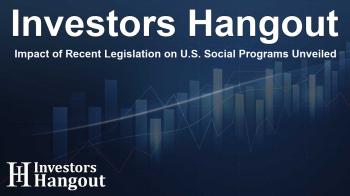Impact of Recent Legislation on U.S. Social Programs Unveiled

Impact of Recent Legislation on U.S. Social Programs Unveiled
Innovating for the Public Good reveals the regulatory challenges affecting social safety net programs, aggravated by new legislation.
A recent report indicates that the One Big Beautiful Bill Act has triggered unprecedented cuts to crucial American social safety programs, leading to complexities that could significantly endanger millions of families. This analysis emerges from the organization, Innovating for the Public Good, which aims to investigate the intricate intersections of democracy and effective governance.
The report titled "Barriers to Benefits: The Decline in Public Trust" systematically dissects the implications of the One Big Beautiful Bill Act, showcasing how it threatens to dismantle vital social safety nets such as the Supplemental Nutrition Assistance Program (SNAP), Medicaid, and the Affordable Care Act (ACA). This analysis not only reveals financial repercussions but also highlights bureaucratic hurdles introduced by the legislation.
National Consequences of Legislative Changes
The report outlines dramatic cuts in funding that could leave millions without essential support. The following points detail some of the staggering fiscal reductions:
- SNAP: Anticipated funding slashes by 20%, amounting to over $186 billion through 2034, significantly affecting state responsibilities regarding benefit costs.
- Medicaid: Proposals suggest cuts exceeding $1 trillion across a decade, shaping it into the most severe reduction the program has ever faced, while imposing biannual eligibility checks.
- ACA: An alarming expiration of enhanced subsidies post-2025 could boost out-of-pocket costs by an estimated 75%, potentially resulting in the loss of coverage for around 4.2 million individuals.
As funding dwindles, experts argue that the combination of eligibility requirements and documentation demands deepen existing barriers to access, ultimately jeopardizing public trust in these essential services.
State-Level Insights on Access to Benefits
The report covers crucial data across nine states, showcasing comprehensive profiles that provide insight into access challenges faced by people. The diverse profiles include:
- Complex Applications: Most states utilize consolidated forms for programs like SNAP and Medicaid; however, fluctuating eligibility requirements cause confusion for applicants.
- Detailed Requirements: Many states require extensive personal data, which complicates the application process and may dissuade eligible individuals from seeking aid.
- State-Specific Complexities: Certain states have additional rules which complicate the application process further, reflecting varying local requirements.
- Renewal Burdens: Regular renewals often entail re-evaluations that continue to complicate access to essential services.
Public Trust Eroded by Legislative Complexity
The crucial takeaway from this report, as expressed by Page S. Gardner, Founder of Innovating for the Public Good, is that the increased bureaucratic complexities introduced by this bill are aimed at undermining access rather than simply cutting funds. These complexities contribute to a growing distrust among the public regarding their government institutions.
Omar Parbhoo, CEO of IFPG, emphasizes the need for innovative solutions to combat the erosion of trust ensuing from bureaucratic challenges. The report calls for an urgent reassessment of strategies that not only preserve funding but also improve the accessibility, efficiency, and understanding of social safety nets.
In conclusion, the research serves as a clarion call for both awareness and action amidst a local and national landscape increasingly inundated with funding cuts and red tape, urging the community and policymakers alike to rethink the structures supporting vital social services.
Frequently Asked Questions
What is the purpose of the report by Innovating for the Public Good?
The report analyzes the impacts of the One Big Beautiful Bill Act on social safety net programs and underscores the challenges posed by bureaucratic regulations.
Which programs are primarily affected by the proposed budget cuts?
The report indicates that SNAP, Medicaid, and the ACA are the key programs facing significant budget cuts and increased bureaucratic barriers.
How do funding cuts affect access to social benefits?
Funding cuts lead to stringent eligibility checks and application processes, potentially leaving millions without critical support and decreasing public trust in government services.
What did Page S. Gardner emphasize regarding bureaucratic hurdles?
Gardner highlighted that the complexity introduced by legislation serves to deny access to essential services, exacerbating public mistrust in government systems.
Why is restoring public trust important?
Restoring public trust is essential for fostering effective democratic systems and ensuring that citizens feel empowered to access the social supports they need during challenging times.
About The Author
Contact Evelyn Baker privately here. Or send an email with ATTN: Evelyn Baker as the subject to contact@investorshangout.com.
About Investors Hangout
Investors Hangout is a leading online stock forum for financial discussion and learning, offering a wide range of free tools and resources. It draws in traders of all levels, who exchange market knowledge, investigate trading tactics, and keep an eye on industry developments in real time. Featuring financial articles, stock message boards, quotes, charts, company profiles, and live news updates. Through cooperative learning and a wealth of informational resources, it helps users from novices creating their first portfolios to experts honing their techniques. Join Investors Hangout today: https://investorshangout.com/
The content of this article is based on factual, publicly available information and does not represent legal, financial, or investment advice. Investors Hangout does not offer financial advice, and the author is not a licensed financial advisor. Consult a qualified advisor before making any financial or investment decisions based on this article. This article should not be considered advice to purchase, sell, or hold any securities or other investments. If any of the material provided here is inaccurate, please contact us for corrections.

